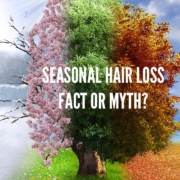Reasons For Hair Loss In Young Women in La Vergne, TN
Regain confidence with solutions for young women’s hair loss.
Hair loss is a common concern among young women, and it can be a distressing experience that affects self-esteem and confidence. While hair loss is often associated with aging, there are many reasons why young women may experience thinning or shedding of hair. Understanding the underlying causes of hair loss is crucial for seeking appropriate treatment and finding solutions to restore hair health. In this comprehensive guide, we will delve into the various factors that contribute to hair loss in young women, empowering them to make informed decisions and seek professional help when needed.
Hormonal Imbalance
Hormonal imbalance is one of the leading causes of hair loss in young women. Fluctuations in hormone levels, particularly during puberty, pregnancy, and menopause, can disrupt the hair growth cycle and result in excessive shedding. Conditions such as polycystic ovary syndrome (PCOS) and thyroid disorders can also contribute to hormonal imbalances, leading to hair thinning and loss. Understanding the impact of hormonal fluctuations on hair health is essential for addressing the root cause of the issue and exploring targeted treatments.
Stress and Emotional Wellbeing
The relationship between stress and hair loss is well-documented, and young women are not immune to the effects of psychological and emotional stress on their hair. High levels of stress, anxiety, and emotional turmoil can trigger a condition known as telogen effluvium, leading to significant hair shedding. Moreover, the pressures of modern lifestyles, academic demands, and professional responsibilities can take a toll on young women, impacting their overall wellbeing and potentially contributing to hair loss. Addressing stress management and prioritizing emotional wellbeing are essential components of holistic hair care for young women.
Nutritional Deficiencies
Proper nutrition plays a vital role in maintaining healthy hair, and deficiencies in key nutrients can lead to hair loss in young women. Iron deficiency anemia, for example, is a common cause of hair thinning and is often prevalent in young women due to menstrual blood loss. Inadequate intake of essential vitamins and minerals, such as vitamin D, vitamin E, and biotin, can also impact the strength and vitality of hair. Identifying and addressing nutritional deficiencies through dietary modifications and supplementation can significantly improve hair health in young women.
Genetic Predisposition
Genetics can also play a significant role in determining a young woman’s susceptibility to hair loss. Female pattern hair loss, known as androgenetic alopecia, is influenced by genetic factors and can manifest in early adulthood. Understanding the genetic predispositions and family history of hair loss is crucial in assessing the potential risk and developing proactive strategies to manage and prevent further hair thinning.
Environmental Factors
Young women are exposed to various environmental factors that can contribute to hair loss. Overexposure to UV radiation, harsh chemical treatments, excessive heat styling, and pollution can weaken the hair shaft and lead to increased breakage and loss. Additionally, lifestyle choices such as smoking and alcohol consumption can also impact the overall health of the hair. Creating awareness about the impact of environmental factors and adopting protective measures can help young women preserve the quality and strength of their hair.
Medical Conditions and Medications
Certain medical conditions and medications can have a direct impact on hair health in young women. Autoimmune disorders, such as lupus and alopecia areata, can result in hair loss, while medications used to treat conditions like acne, depression, and high blood pressure may have hair-thinning side effects. Consulting with healthcare professionals and acknowledging the potential implications of underlying medical conditions and medications is essential for addressing hair loss comprehensively.
Closing considerations
Hair loss in young women can be attributed to a myriad of factors, ranging from hormonal imbalances and stress to genetic predispositions and environmental influences. nderstanding the multifaceted nature of hair loss, young women can proactively address the underlying causes and seek personalized treatments to restore and maintain healthy hair. Seeking professional guidance from experienced specialists can empower young women to navigate their hair loss journey with confidence and resilience.












